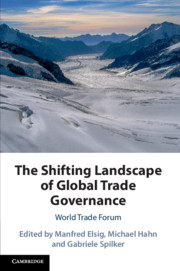Book contents
- The Shifting Landscape of Global Trade Governance
- The Shifting Landscape of Global Trade Governance
- Copyright page
- Contents
- Figures
- Tables
- Contributors
- Preface
- Abbreviations
- 1 Introduction
- Part I New and Old Challenges
- Part II Trade Policy and Trade-Related Concerns
- 7 Reconceiving Trade Agreements for Social Inclusion
- 8 Our Alarming Climate Crisis Demands Border Adjustments Now
- 9 The Multilateralization of PTAs’ Environmental Clauses
- 10 The Trend to More and Stricter Non-Trade Issues in Preferential Trade Agreements
- Part III Development Angles
- Part IV Diffusion across Economic Treaties
- Index
- References
8 - Our Alarming Climate Crisis Demands Border Adjustments Now
from Part II - Trade Policy and Trade-Related Concerns
Published online by Cambridge University Press: 05 August 2019
- The Shifting Landscape of Global Trade Governance
- The Shifting Landscape of Global Trade Governance
- Copyright page
- Contents
- Figures
- Tables
- Contributors
- Preface
- Abbreviations
- 1 Introduction
- Part I New and Old Challenges
- Part II Trade Policy and Trade-Related Concerns
- 7 Reconceiving Trade Agreements for Social Inclusion
- 8 Our Alarming Climate Crisis Demands Border Adjustments Now
- 9 The Multilateralization of PTAs’ Environmental Clauses
- 10 The Trend to More and Stricter Non-Trade Issues in Preferential Trade Agreements
- Part III Development Angles
- Part IV Diffusion across Economic Treaties
- Index
- References
Summary
Our climate crisis is now an emergency. While efforts at multilateral cooperation should continue, it is too late to delay legal multilateral and unilateral trade measures any longer. This chapter sketches a preliminary illustration of a border carbon adjustment (BCA) proposal that differs significantly from earlier ones. Its goals are to induce policy improvement by governments of high-polluting countries and defend the Paris Agreement. Each country that imposes positive net taxes on fossil fuel use at home should set a default BCA on an imported product from a high-emitting country equal to net fossil energy taxes applied on the competing home good throughout its supply chain. The government should deduct from this surcharge for a given import shipment to the extent that costs due to carbon energy taxes — or other measures that are comparable in effectiveness in reducing emissions — have already been paid on the import. These surcharges should exempt all exports from countries whose per capita carbon dioxide emissions are low. Such BCAs could be consistent with World Trade Organization rules and should minimize additional transaction costs on trade. Objections are addressed. Paradoxically trade itself in the long term needs carefully limited trade restrictions in the short term.
- Type
- Chapter
- Information
- The Shifting Landscape of Global Trade GovernanceWorld Trade Forum, pp. 182 - 206Publisher: Cambridge University PressPrint publication year: 2019
References
- 1
- Cited by



